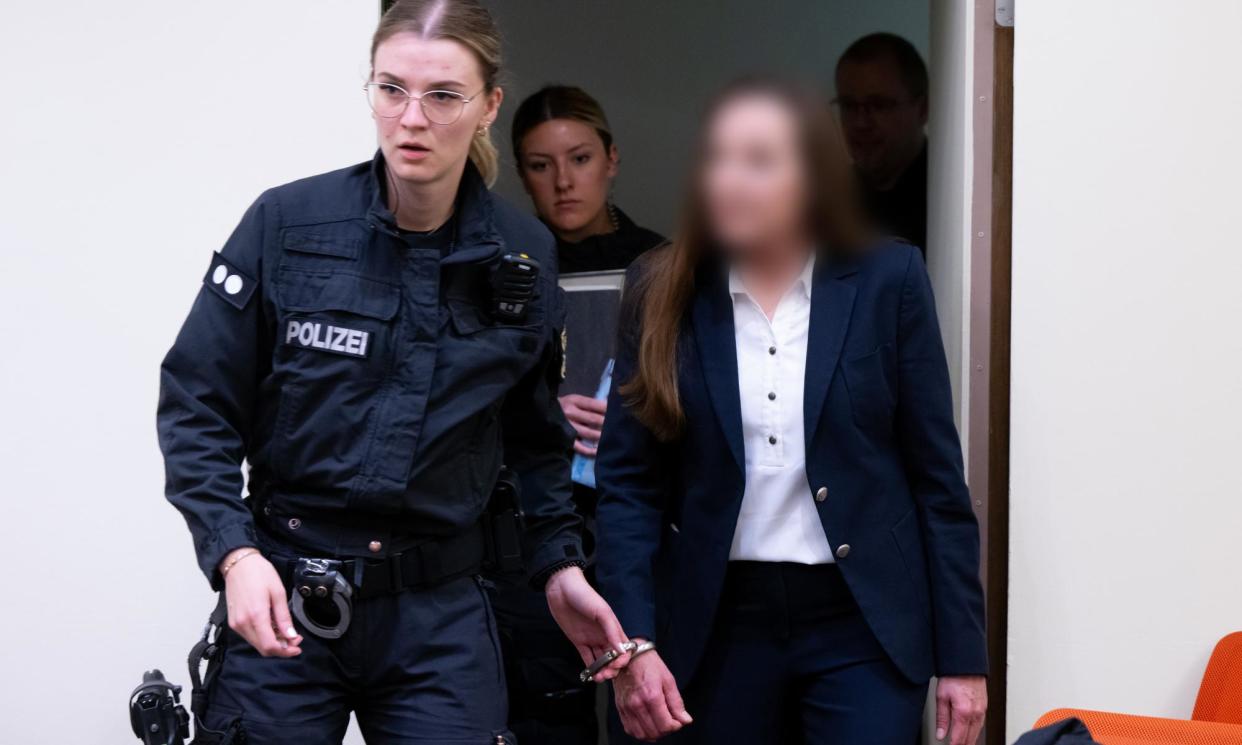Trial opens of ‘esoteric’ wing of alleged German coup plotters

Eight alleged members of the German far-right Reichsbürger have gone on trial accused of a plot to violently overthrow the state, in the third in a row of similar court cases being held across the country.
The defendants, including a GP, a celebrity chef and an astrologer, are accused of serving as the plot’s leadership council and, prosecutors say, were set to become a cabinet in waiting if the group’s plan to storm the parliament building and overthrow the government had succeeded.
They are charged with membership of a terrorist organisation and preparing an act of high treason. The group had plans in place to kidnap Germany’s chancellor, Olaf Scholz, and parade him on television in the hope of winning more followers to their cause, prosecutors say.
The accused deny the charges.
The Munich trial is taking place amid huge security as Germany struggles with fears about the rise of the far right following its recent success in European elections, and in the wake of a flurry of arrests involving people accused in separate incidents of spying for Russia and China.
At the centre of the alleged plot is Heinrich XIII Prince Reuß, a pseudo aristocrat and estate agent whom the group intended to appoint as its interim leader. He is on trial in Frankfurt alongside others considered to be among the ringleaders.
Defence lawyers in the cases have denied that the accused are terrorists and instead suggested they were conspiracy theorists who found each other due to their opposition to coronavirus restrictions. Lawyers for Prince Reuß have said he denies being violent or having made plans to kill people.
The alleged plot was first revealed to the public through a series of anti-terror raids across 11 German states as well as abroad in December 2022 after an undercover investigation by police.
Held at a high-security court in Munich, the trial of the so-called esoteric wing is, like two others taking place in Stuttgart (the so-called military wing) and Frankfurt am Main (allegedly the core plotters), scheduled to last until January but could, prosecutors have said, take years to complete.
“We have around 900 files of information and every day more and more pages are being added to them,” Laurent Lafleur, a spokesperson for the court, said ahead of the opening, explaining that the investigation continued even as the trials are up and running. Each defendant will be represented by two defence lawyers.
Due to the group being tried in three different locations, judges, prosecutors and lawyers of all the trials involving a total of 26 defendants are reportedly engaged in a frantic exchange of information, while the defendants of each trial can be expected to be brought to the other trials to give evidence, adding to the mammoth organisational task.
“It is a huge logistical effort,” Lafleur said. He said the court was prepared for disturbances, “whether from Reichsbürger or Querdenker, who might visit the trial,” a reference to the coronavirus denial movement Querdenker.
Among those on trial in Munich are Hildegard Leiding, 60, a member of the rightwing AfD party and an astrologer, who was allegedly destined to become the group’s “trans-communications minister”.
Together with a welder from the Bavarian rocker scene, Leiding was said to have used “spiritual criteria” to pick out appropriate candidates for the future government, including a celebrity cook from Austria, tasked with feeding the new regime a healthy diet, and a practising GP, described by former patients as “established and respected” in her community.
The woman, who is said to have become radicalised during the pandemic and specialised in a method of predicting the future through reading eggs, known as oomancy, was expected to become the health minister. She had donated €47,000 of her own money to the plot, most of which went towards arms training, prosecutors say.
After her arrest, her practice partner in a small town in Lower Saxony put a notice up on the door of their surgery stating that the news that she had been arrested for her alleged involvement in a terrorist organisation “came as a complete surprise for me and the whole practice team … we are shocked and distance ourselves from any such rightwing extremist ideology.”
There are estimated to be about 23,000 Reichsbürger in Germany, about 10% of whom are thought to be willing to use violence and 1,000 of whom are believed to be part of the rightwing extremist scene.

 Yahoo News
Yahoo News 
